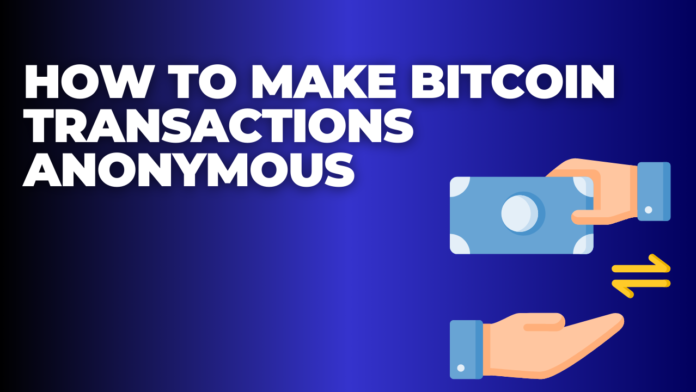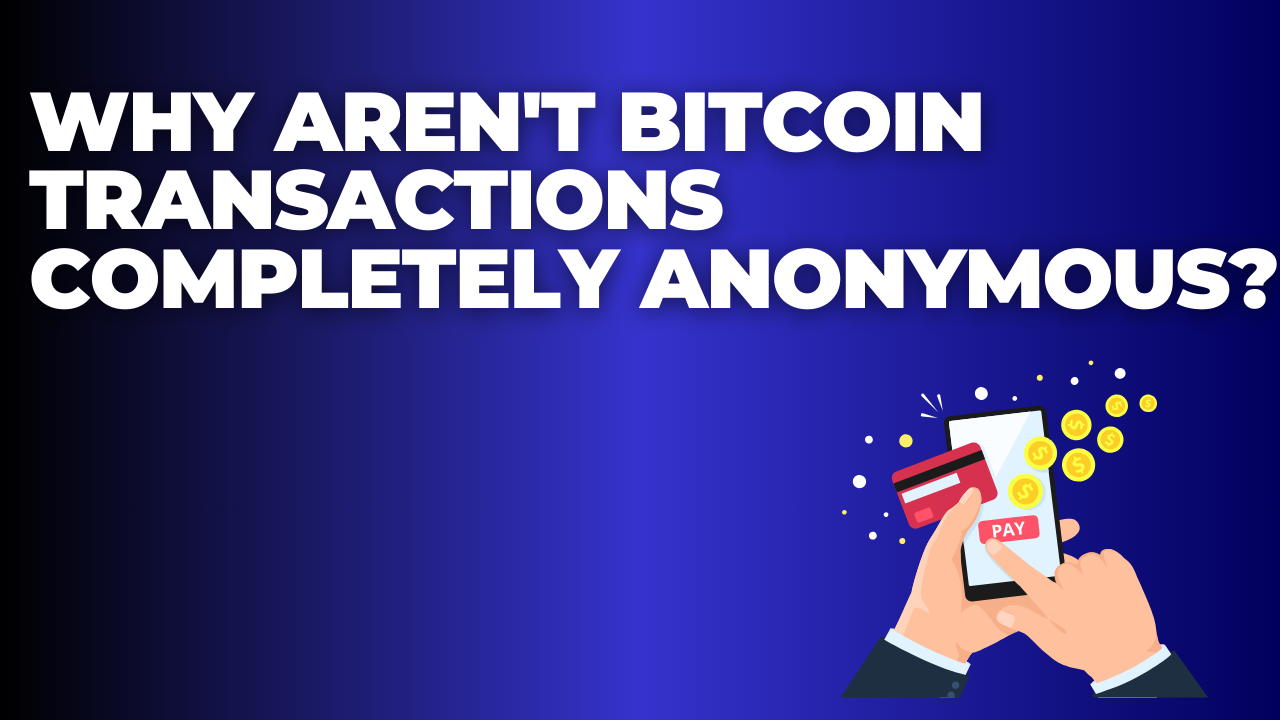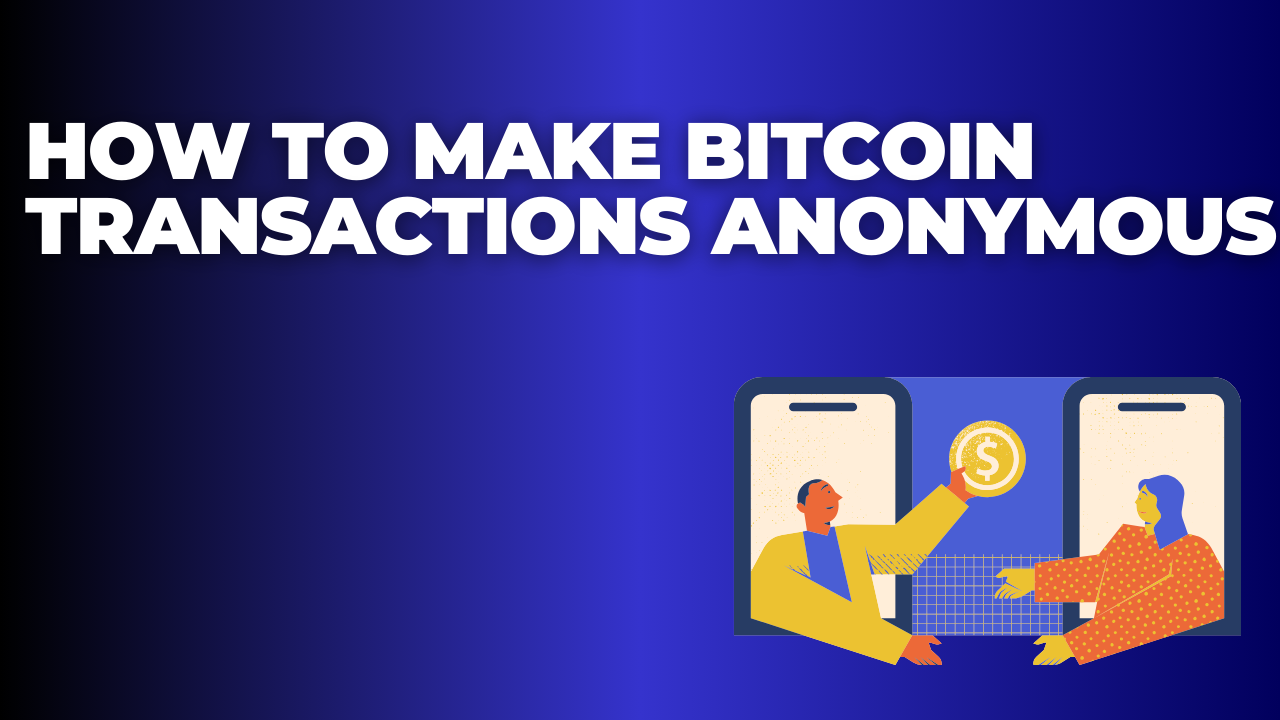Introduction
Bitcoin is often considered private and anonymous, but the reality is quite different. While it provides some level of privacy. Bitcoin transactions are recorded on a public ledger called the blockchain which makes them traceable. However, there are ways to make Bitcoin transactions more anonymous if you take the right steps. This guide explains how you can increase the anonymity of your Bitcoin transactions while staying safe.
Why Aren’t Bitcoin Transactions Completely Anonymous?
Bitcoin transactions are pseudonymous, which means they are connected to wallet addresses instead of being directly tied to individual identities. Each Bitcoin address is like an account number that records transactions on the blockchain. While your name isn’t directly attached to the address with enough effort, someone could link your address to your identity especially if you’ve used an exchange that requires identity verification (KYC).
How to Make Bitcoin Transactions Anonymous
Although Bitcoin isn’t fully anonymous by default you can take several steps to enhance your privacy and keep your transactions away from prying eyes. Let’s explore these methods.
1. Use a New Bitcoin Address for Each Transaction
One of the simplest ways to boost privacy is by using a new Bitcoin address for every transaction. Many wallets support this feature allowing you to generate a new address every time you receive or send Bitcoin. This makes it more challenging for someone to link all your transactions to one identity.
2. Use a Bitcoin Mixer (Tumbler)
A Bitcoin mixer, also known as a tumbler, is a service that breaks the link between the sender and receiver of a transaction. It works by mixing your coins with those of other users, making it difficult to trace where the coins originated. Some popular mixing services include Wasabi Wallet and Samourai Whirlpool. Keep in mind that mixing services can involve fees and there may be legal considerations, depending on your country’s laws.
3. Use a Privacy-Focused Bitcoin Wallet
Some Bitcoin wallets prioritize privacy and anonymity. Wasabi Wallet and Samourai Wallet are two examples of privacy-focused wallets that include features like coin mixing, generating new addresses, and obfuscating your transaction history. These wallets can help you make transactions harder to trace.
4. Use the Tor Network or a VPN
When making Bitcoin transactions, consider using the Tor network or a VPN to hide your IP address. Tor anonymize your internet traffic by routing it through multiple nodes, making it difficult to trace the origin of your transactions. A VPN can also provide an additional layer of security by masking your real IP address, helping to protect your privacy when sending or receiving Bitcoin.
5. Avoid Using Centralized Exchanges
Centralized exchanges often require users to complete identity verification (KYC) which can compromise your anonymity. Instead, consider using decentralized exchanges (DEXs) which don’t require personal information to trade cryptocurrencies. DEXs like Uniswap offer peer-to-peer trading without the need for KYC, helping maintain your privacy during transactions.
6. Use Monero or Other Privacy Coins
If anonymity is your top priority, consider converting your Bitcoin to a privacy-focused cryptocurrency like Monero (XMR). Monero uses advanced cryptographic techniques to make transactions completely private and untraceable. After completing transactions with Monero, you can exchange it back to Bitcoin if needed. This method allows you to break the link between your Bitcoin transactions while benefiting from the privacy of Monero.
7. Pay Attention to Transaction Amounts
Large, distinct transactions can be easier to trace than smaller, more frequent ones. If possible, break up larger Bitcoin transactions into smaller amounts. This can make it harder for someone to track your activity and tie it to a specific identity or wallet.
8. Use Bitcoin ATMs with Caution
Bitcoin ATMs offer the convenience of buying and selling Bitcoin with cash but they often require identity verification. However, some ATMs have lower verification thresholds allowing for small, anonymous transactions. Check the regulations and limits at the ATM you’re using to ensure your transaction remains anonymous.
9. Stay Vigilant About Your Online Activity
While it’s crucial to take steps like using mixers and privacy wallets don’t overlook your overall online activity. Be cautious about linking your personal information to Bitcoin transactions in any way. Avoid sharing your wallet addresses publicly or associating them with identifiable online accounts.
Conclusion: Enhancing Bitcoin Transaction Anonymity
While Bitcoin isn’t inherently anonymous, there are several ways you can take control of your privacy and make your transactions harder to trace. Using tools like privacy-focused wallets, mixing services, decentralized exchanges, and privacy coins like Monero can significantly improve the anonymity of your Bitcoin transactions. Always stay mindful of the methods you use and continue to educate yourself on new privacy-enhancing techniques in the ever-evolving world of cryptocurrency.
Large transactions into smaller amounts can make it more difficult for someone to track and link the transactions to a specific wallet or identity.
FAQs About Making Bitcoin Transactions Anonymous
Q1: Are Bitcoin transactions anonymous by default?
No, Bitcoin transactions are pseudonymous. While your name isn’t directly tied to your Bitcoin address, all transactions are recorded on the public blockchain. With enough information, someone could trace your Bitcoin activity back to your identity.
Q2: How can I make my Bitcoin transactions more anonymous?
You can increase the anonymity of your Bitcoin transactions by using privacy-focused wallets, coin mixers, new addresses for each transaction, the Tor network or VPNs, and avoiding centralized exchanges that require identity verification.
Q3: What is a Bitcoin mixer, and how does it work?
A Bitcoin mixer (also known as a tumbler) is a service that mixes your Bitcoin with others’ coins, making it difficult to trace the origin of the funds. This process helps break the link between the sender and receiver, increasing transaction anonymity.
Q4: Which Bitcoin wallets are best for anonymity?
Privacy-focused wallets like Wasabi Wallet and Samourai Wallet offer built-in tools like coin mixing and address obfuscation to help make your Bitcoin transactions more anonymous.
Q5: Can using a VPN or Tor improve the privacy of Bitcoin transactions?
Yes, using a VPN or the Tor network hides your IP address when making Bitcoin transactions, adding an extra layer of privacy by making it harder to trace your internet activity back to your physical location.
Q6: Should I avoid centralized exchanges to maintain anonymity?
Yes, if anonymity is your goal, it’s best to avoid centralized exchanges, as they often require identity verification (KYC). Decentralized exchanges (DEXs) like Bisq allow for peer-to-peer transactions without the need for personal information.
Q7: Are there any cryptocurrencies that are more anonymous than Bitcoin?
Yes, privacy coins like Monero (XMR) and Zcash (ZEC) are designed with advanced privacy features that make transactions untraceable. You can use these coins to enhance your privacy before converting them back to Bitcoin if needed.
Q8: Is it legal to use Bitcoin mixers?
The legality of Bitcoin mixers depends on the country. Some governments view them with suspicion due to their potential use in illegal activities. It’s important to check the regulations in your jurisdiction before using a mixer.
Q9: Can I stay anonymous when using a Bitcoin ATM?
Most Bitcoin ATMs require some form of identity verification especially for larger transactions. However, some ATMs allow smaller, anonymous transactions with cash. Always check the limits and requirements before using an ATM.
Q10: Does breaking large Bitcoin transactions into smaller amounts help with anonymity?
Yes, splitting large transactions into smaller amounts can make it more difficult for someone to track and link the transactions to a specific wallet or identity.


